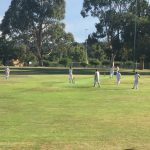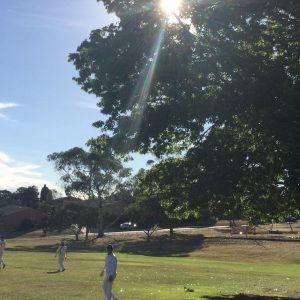How does one give up cricket? How does one declare when the time comes?
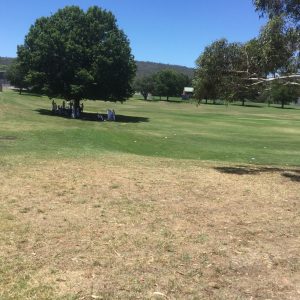
For my close friend and colleague, the end came in a welter of bad feeling and recrimination. Always someone who wanted to give back to the game, he volunteered at the end of last season to umpire a fifth grade final. Having failed to uphold two or three appeals for caught behind on the grounds that he heard and saw no edge, he was verbally set upon after the game by a small group of angry grown men. For a while it threatened to become even worse than verbal.
For him this was the last straw. During the season and for some time previously he had rather begrudged the time spent on the game. And each time he padded up, normally to take first strike, he asked himself why he was putting himself through such unnecessary stress. So he told our supremo, Col, that he was no longer available.
I don’t have the courage to do that. I am not good at closing chapters. Once begun, I have to finish reading a book even if I’m not enjoying it.
But fortunately what happened two weeks ago put me in mind of a plan. It was a hot Saturday and I would have found it difficult to be in the field for 45 overs. As luck would have it, our third grade side finished early (we are fifth grade) and five of them turned up at our home ground and were keen to sub in the field. So I was able to be a part of the team, play in the game, but only field for 15 or so overs in the heat.
I communicated the grand plan to Col in the Golf Club afterwards. Col would make me twelfth man in fifth grade each week and I could score or perhaps umpire. And if it wasn’t too hot I could offer some respite to my colleagues when we were in the field.
A good plan. Sensible.
But when I arrived at the ground Zac, our captain, said we had nine – or 10 with me. It was forecast to be 38°.
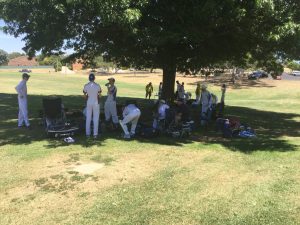
The tree which is our home ground pavilion casts a shadow on a small arc of the outfield for the first few hours of the game. Gradually, as time passes, the area in shadow leaves the outfield, rather reluctantly crosses the boundary and turns its back on the game.
An important part of my contentment at being part of the team is that I feel cared for. Without any verbal confirmation of the idea, my position in the field was clear to everyone – even to the opposition, who made sure that I kept hydrated. Staying in the shaded area meant that when there were two right-handers batting I was at third man (right on the edge, naturally) and long-on (right on the edge). Occasionally I would venture towards the wicket when the apparent ability of the batsman made it seem potentially useful for me to be closer to the action.
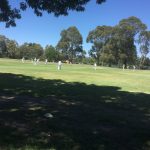
At third man and, especially, at long-on – I think because of the different angle of the trees in the background – my fielding was certainly not useful. What everyone can see is that I am slow to move, and cannot bend, run or throw. What they cannot know is that I cannot see. The only way in which I can detect that the ball is coming to me at long-on is by the body language of the batsman and the fielders: if everyone turns to me in apparent expectation, the ball is likely to be on its way .
Fortunately this didn’t happen very much, the most notable exception being when I happened to be close up at mid-on and their captain spooned it gently in my direction. It was perhaps some sort of peace offering, and while I was trying to decide what to do about it, Zac – the other Zac, not our captain – charged across from midwicket and dropped it, as I would have done, only with much greater effort. It didn’t matter much; the batsman was out soon after.
No game in fifth grade is completely satisfactory without some niggle. The background to the day’s niggle was evident to me through what I was able to overhear from my vantage point in the shade and close to the tree where the opposition, like us, were camped. Because we are a Queanbeyan team their attitude towards us is influenced by prejudices relating to occupation, income, class and language. Among the jibes was one to the effect that “We are in Queanbeyan – but not of Queanbeyan”.
Mind you, in the jibes and sledging stakes, we are top of the table. Our Rick, a talented, vociferous 17-year-old, took the lead in complaining about the sportsmanship of their opener who, the way we saw it, failed to walk when he nicked one to the extremely tidy Jason behind the stumps. After that it was on for young and old, particularly between the two of them. Rick had the major victory by bowling him soon after and I heard his adversary and his colleagues under the tree planning how they were to get back at Rick when he batted. I wondered whether they were wise to plot such things given the natural talent I have seen Rick demonstrate with the bat. Had he batted they might have be in for a nasty shock.
Anyway the stage is set: They-don’t-much-like-us, and We-don’t-like-them.
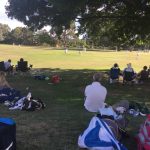
Their innings prospered, particularly in one over from Zac (fielder not captain) to ‘Binger’. I was up at short mid-on and he pulled the ball along the ground to my right. I was within an inch of ‘diving’ for it (ie falling down and reaching for it) – but an inch is enough in my condition and it sped to the boundary with me having failed to lose my feet. I felt more than the usual remorse for not having stopped it when Binger, with his momentum up, pulled four of the next five through mid-wicket for more fours. Twenty off the over. That seemed like a significant setback to our chances.
The next setback was when the sprinklers came on at the far end of the field. It was towards the end of our time in the field. They had 10 men and their ninth wicket fell in the 43rd over. A clump of four or five sprinklers at the far end of the outfield were on, with one of them trespassing on the actual wicket. There followed a full hour during which people of both sides made calls on their mobiles to various Council numbers, wandered around the whole area searching for a hole in the ground and stop-cock, and disserted unfavourably on the situation relating to paying rates and on the frailties of local government. (I was relieved that Nick and Alex weren’t with us, so that none of the unkind reflections could get back to the Mayor directly.)
Meanwhile my captain, Zac, had been calling for a volunteer to open with him. I didn’t need to keep my head down since it would be obvious to everyone that I would bat last. But everyone else was exercising modesty about their credentials as an opener, had gone to Macca’s, or were hunting the stop-cock.
“Hey Gordy. Will you open please. We might as well get it over and done with so you can go home perhaps. It’s hot.”
In fact, just for the while the sky became speckled with cloud and there was little direct sunlight. I lay down on the grass, padded up, and drank a lot of water.
By the time two men with fluoro-vested tummies had arrived to join and give a semblance of professionalism to the stop-cock hunt, the watering cycle had passed through the phase in which the middle group of four sprinklers were doing their thing and it was clear that very soon it would be the four or five immediately adjacent to our teams’ camping ground. The pace of excitement grew, with full (and so weighty) eskies being placed tactically on the sprinklers nearby to stem the aerial tide.
I’m not sure whether a useful tap was discovered or whether the pre-determined watering cycle came to its natural end, but very soon discussion turned from questions of a re-match and the grounds to which we might move, to how long it would take for the affected areas to dry out.
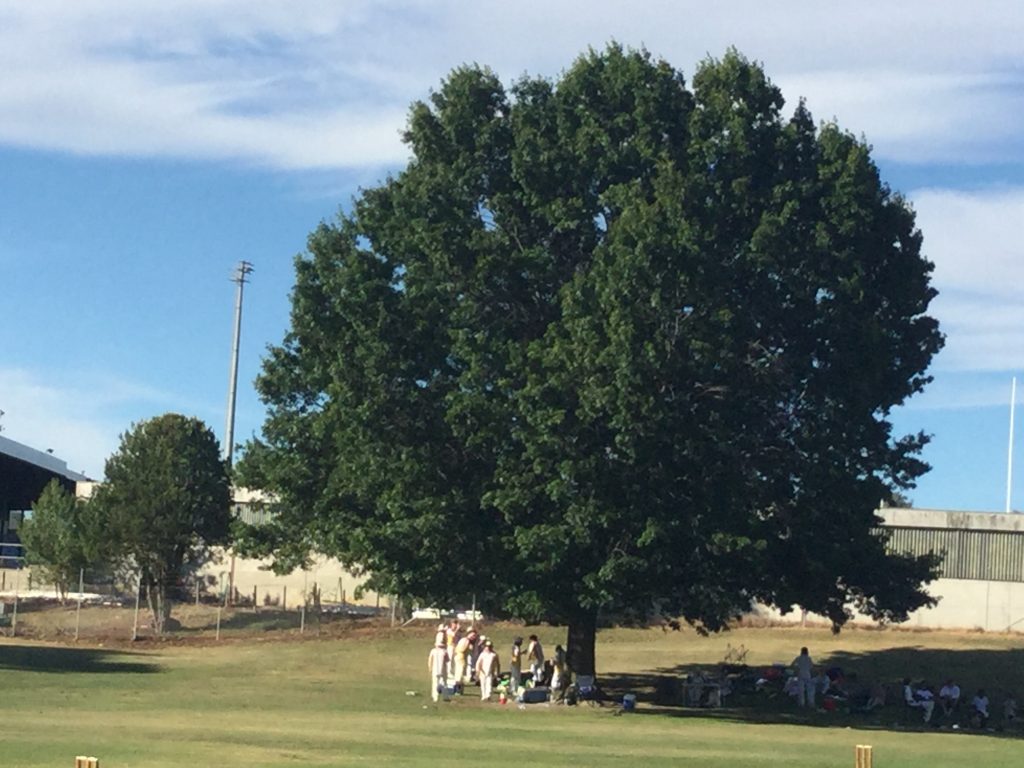
The opposition – recall that although we have been joined in friendly banter about the Queanbeyan Council, “We-don’t-like-each-other” – must have felt confident when play resumed, having posted 204 when all out.
Zac and I put on 39 in the first ten overs, with my contribution including a decent square cut. Following its execution I stood stock still in a mixture of amazed marvel, strong hope that it would reach the boundary, and a lack of enthusiasm for running. Zac came to join me at my end and began the fruitless challenge of persuading me to run at least a single. It made the boundary by a few yards. Our friend the opposition opener was at first slip, chirruping away with banter-cum-sledging.
During the ninth and ten overs I was feeling a form of heat different from his sledging; the direct sunshine was back. It must have been nearly 5.30. I determined to arrange my leave from the crease. Jasper fetched me out a drink from under the tree and next ball, the first of the 11th over, struck me low on the pad and in line. I turned, not needing to check for Rick’s raised finger, and left, passing the chatty slip fielder on the way back to the much-needed shade.
He may have felt that he was in the ascendancy but I had a feeling he would be less chatty in an hour or so.
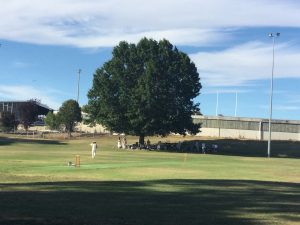
Captain Zac made 46. Jack and the other Zac then put on 96. Jack batted extremely well: calm, watchful as necessary and punishing to the bad ball. Towards game’s end we needed 16 off five overs, 11 off four. Jack finished the match with a sweetly-timed pull for six over mid wicket, taking him to 96*.
During this period I did the lap of the ground – something I’ve done so rarely in my time with the Queanbeyan Razorbacks – and went to the Golf Club feeling chuffed. Col wasn’t there so I couldn’t congratulate him on the success of our plan for me slowly to retire.
